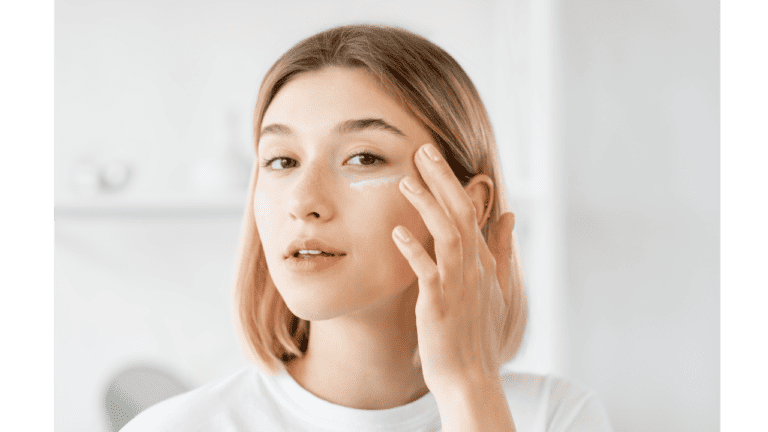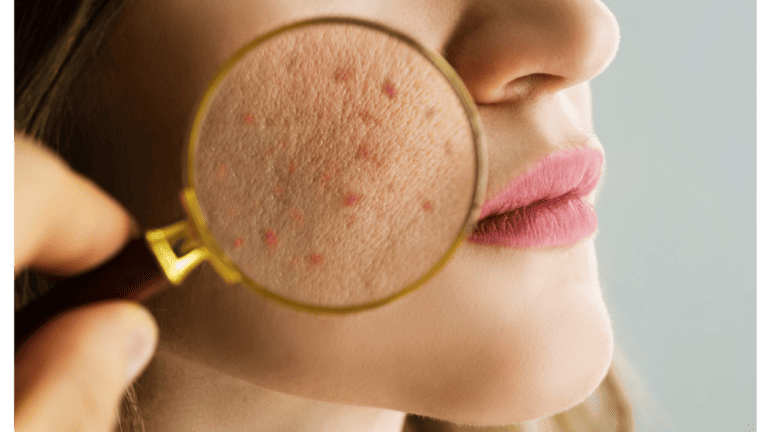Vitamin C is a popular ingredient in skincare products due to its numerous benefits for the skin. It is known to brighten the complexion, reduce the appearance of fine lines and wrinkles, and protect the skin from environmental damage. However, some people have reported that using vitamin C serum has caused their skin to darken, leaving them wondering why this is happening.
The main reason why vitamin C serum can darken the skin is due to its high acidity. Vitamin C, also known as ascorbic acid, is a powerful antioxidant that helps to protect the skin from free radical damage. However, when it is applied to the skin, it can cause a mild exfoliating effect, which can lead to the removal of dead skin cells and the exposure of new skin cells. This can cause the skin to appear darker initially, but with continued use, the skin should become brighter and more even-toned.
Also, the type of vitamin C used in the serum can affect its effectiveness and potential for causing dark spots. L-ascorbic acid is the most effective form of vitamin C for the skin, but it is also the most unstable and can easily oxidize, causing it to lose its potency and potentially cause dark spots. Other forms of vitamin C, such as tetrahexyldecyl ascorbate and sodium ascorbyl phosphate, are more stable and less likely to cause dark spots.
Understanding Vitamin C and Skin Health
Role of Vitamin C in Skin Care
Vitamin C, also known as ascorbic acid, is a powerful antioxidant that plays a crucial role in maintaining skin health. It helps to protect the skin from harmful free radicals that can cause cell damage and accelerate the aging process. Vitamin C also helps to stimulate collagen production, which is essential for maintaining the skin’s elasticity and firmness.
In addition to its antioxidant properties, vitamin C has been shown to have skin brightening effects. It can help to reduce the appearance of dark spots and hyperpigmentation by inhibiting the production of melanin, the pigment that gives skin its color.
Types of Vitamin C in Skincare Products
There are several different types of vitamin C that are commonly used in skincare products. L-ascorbic acid is the most common and well-studied form of vitamin C in skincare. It is highly effective at protecting the skin from free radical damage and stimulating collagen production.
Magnesium ascorbyl phosphate is a stable form of vitamin C that is less irritating to the skin than l-ascorbic acid. It is also effective at brightening the skin and reducing the appearance of dark spots.
Tetrahexyldecyl ascorbate is a lipid-soluble form of vitamin C that is highly stable and easily absorbed by the skin. It has been shown to be effective at reducing the appearance of fine lines and wrinkles.
Ascorbyl glucoside is a water-soluble form of vitamin C that is less irritating to the skin than l-ascorbic acid. It is effective at brightening the skin and reducing the appearance of dark spots.
When choosing a vitamin C product, it is important to consider the type of vitamin C used and the concentration of the ingredient. Higher concentrations of vitamin C may be more effective, but can also be more irritating to the skin. It is important to start with a lower concentration and gradually increase as the skin becomes accustomed to the product.
Potential Causes of Skin Darkening
Vitamin C is an essential nutrient that plays a crucial role in maintaining healthy skin. However, some people have reported that using Vitamin C serums has caused their skin to darken. There could be several potential causes of skin darkening, which are discussed below.
Oxidation and Vitamin C Serums
One possible cause of skin darkening could be the oxidation of Vitamin C serums. Vitamin C is an unstable molecule that is prone to oxidation when exposed to air and light. When Vitamin C oxidizes, it can produce free radicals that can damage the skin and cause hyperpigmentation. Therefore, it is essential to use Vitamin C serums that contain stable forms of Vitamin C, such as L-ascorbic acid, and store them in a cool, dark place to prevent oxidation.
Interactions with Other Skincare Ingredients
Another possible cause of skin darkening could be interactions between Vitamin C serums and other skincare ingredients. For example, some studies have suggested that using niacinamide and Vitamin C together can cause skin darkening. However, the evidence is not conclusive, and more research is needed to confirm this. Similarly, using Vitamin C serums with Vitamin E or ferulic acid can enhance their effectiveness and prevent skin darkening.
In summary, skin darkening is a potential side effect of using Vitamin C serums. The oxidation of Vitamin C and interactions with other skincare ingredients could be the possible causes of skin darkening. It is essential to use stable forms of Vitamin C and store them properly to prevent oxidation. Additionally, using Vitamin C serums with other skincare ingredients, such as Vitamin E and ferulic acid, could enhance their effectiveness and prevent skin darkening.
How to Use Vitamin C Safely

When used correctly, Vitamin C serums can provide many benefits for the skin, including brightening and anti-aging effects. However, it is important to use them safely to avoid any negative side effects, such as skin darkening.
Proper Application of Vitamin C Serums
To ensure safe use of Vitamin C serums, it is important to apply them correctly. First, start with a clean face and apply a small amount of serum to the face and neck. Gently massage the serum into the skin until it is fully absorbed.
It is also important to pay attention to the concentration of Vitamin C in the serum. Higher concentrations can be more effective, but they can also be more irritating to the skin. Start with a lower concentration and gradually increase as tolerated.
Importance of Sun Protection
One of the main reasons Vitamin C serums can cause skin darkening is due to sun exposure. UV rays can cause damage to the skin and lead to hyperpigmentation. Therefore, it is crucial to use sunscreen or other forms of sun protection when using Vitamin C serums.
Look for a broad-spectrum sunscreen with an SPF of 30 or higher and apply it daily, even on cloudy days. It is also important to reapply sunscreen every two hours if you are spending time outdoors.
Antioxidants
In addition to sun protection, it is important to use other antioxidants to protect the skin from damage. Vitamin C is a powerful antioxidant, but it can work even better when combined with other antioxidants such as Vitamin E and Ferulic Acid.
Look for serums that contain a combination of these antioxidants to provide maximum protection for the skin.
Overall, by using Vitamin C serums correctly and protecting the skin from sun damage, individuals can safely enjoy the many benefits of this powerful ingredient.
Addressing Skin Discolouration
Treating Hyperpigmentation
Hyperpigmentation is a common skin condition characterized by dark patches on the skin. It occurs when there is an overproduction of melanin, the pigment that gives color to the skin. Hyperpigmentation can be caused by a variety of factors, including sun exposure, hormonal changes, and inflammation.
One way to treat hyperpigmentation is by using topical products that contain brightening agents such as retinoids, kojic acid, azelaic acid, arbutin, and green tea. These ingredients work by inhibiting the production of melanin and promoting skin cell turnover.
Choosing the Right Vitamin C Product
Vitamin C is a popular ingredient in skincare products due to its ability to brighten the skin and reduce the appearance of dark spots. However, some people may experience skin darkening or discoloration when using vitamin C products.

To avoid this, it is important to choose the right vitamin C product. Look for products that contain stable forms of vitamin C, such as ascorbyl glucoside or magnesium ascorbyl phosphate. These forms of vitamin C are less likely to oxidize and cause skin discoloration.
It is also important to use vitamin C products as directed and to start with a lower concentration to avoid irritation. Gradually increase the concentration as your skin tolerates it.
Overall, addressing skin discoloration requires a combination of topical products and lifestyle changes. By incorporating brightening agents such as vitamin C and choosing the right products, you can achieve a brighter, more even complexion.
Common Misconceptions and Tips
Myths About Vitamin C and Hyperpigmentation
There are many myths surrounding the use of Vitamin C in skincare, and one of the most common is that it can darken the skin and cause hyperpigmentation. While it is true that Vitamin C can cause a temporary orange tint to the skin, it will not permanently darken the skin. This is because Vitamin C is a water-soluble vitamin that is easily absorbed by the skin and does not produce melanin, the pigment responsible for skin color. Instead of your vitamin C Serum has oxidized, it no longer helps hyperpigmentation and thus,
Another common myth is that Vitamin C is only suitable for certain skin types, and definitely not for sensitive skin. However, this is not true. Vitamin C is suitable for all skin types, including sensitive skin, and can be used to brighten and improve the overall appearance of the skin, it depends on the strength and intensity of the serum you are using.
Helpful Tips for Optimal Results
To get the best results from using Vitamin C in your skincare routine, it is important to follow a few simple tips. Firstly, it is important to choose a high-quality Vitamin C serum that contains a stable form of Vitamin C, such as L-ascorbic acid. This will ensure that the serum is effective and does not oxidize, which can cause it to lose its potency.
Secondly, it is important to apply the serum correctly. To do this, apply a few drops of the serum to clean, dry skin and massage it gently into the skin using upward, circular motions. It is also important to allow the serum to absorb fully before applying any other skincare products.
Finally, it is important to use sunscreen when using Vitamin C in your skincare routine. This is because Vitamin C can make the skin more sensitive to the sun, which can lead to sunburn and other skin damage. By using sunscreen, you can protect your skin from the harmful effects of the sun and ensure that your Vitamin C serum is working effectively to brighten and improve the overall appearance of your skin.
Frequently Asked Questions
What are the potential side effects of using a Vitamin C serum on the face?
Vitamin C serum is generally considered safe for most people. However, some individuals may experience side effects such as redness, dryness, or itching. These side effects are usually mild and temporary. It is recommended to conduct a patch test before using Vitamin C serum on the face to avoid any adverse reactions.
How might stopping the use of Vitamin C serum affect my skin tone?
Stopping the use of Vitamin C serum may not have any significant impact on skin tone. However, it is essential to continue using a broad-spectrum sunscreen to prevent damage to the skin when you’re using Vitamin C Serum and after stopping the use of Vitamin C Serum
Can the use of Vitamin C serum lead to hyperpigmentation issues?
While Vitamin C serum is known to help reduce hyperpigmentation, it is possible that some individuals may experience hyperpigmentation issues due to the use of Vitamin C serum. This is because Vitamin C can cause the skin to produce more melanin, leading to darker skin. However, this effect is usually temporary and will fade over time.
Is it possible for Vitamin C serum to cause a change in skin color?
Yes, it is possible for Vitamin C serum to cause a change in skin color. Some individuals may experience a tanned or darker appearance after using Vitamin C products. This is because Vitamin C can react with the amino acids in the skin, leading to a temporary change in skin color. However, this effect is usually temporary and will fade over time.
How should Vitamin C serum be properly applied at night?
To properly apply Vitamin C serum at night, start by cleansing the face and patting it dry. Apply a small amount of serum to the face and neck, avoiding the eye area. Massage the serum into the skin using gentle, circular motions. Allow the serum to absorb fully before applying moisturizer.
Why might someone experience a tanned or darker appearance after using Vitamin C products?
Some individuals may experience a tanned or darker appearance after using Vitamin C products due to the oxidation process of Vitamin C. Ascorbic acid, the most common form of Vitamin C used in skincare products, can oxidize when exposed to air, heat, or light. This oxidation process can cause the serum to turn brown or yellow and may lead to a temporary change in skin color.






